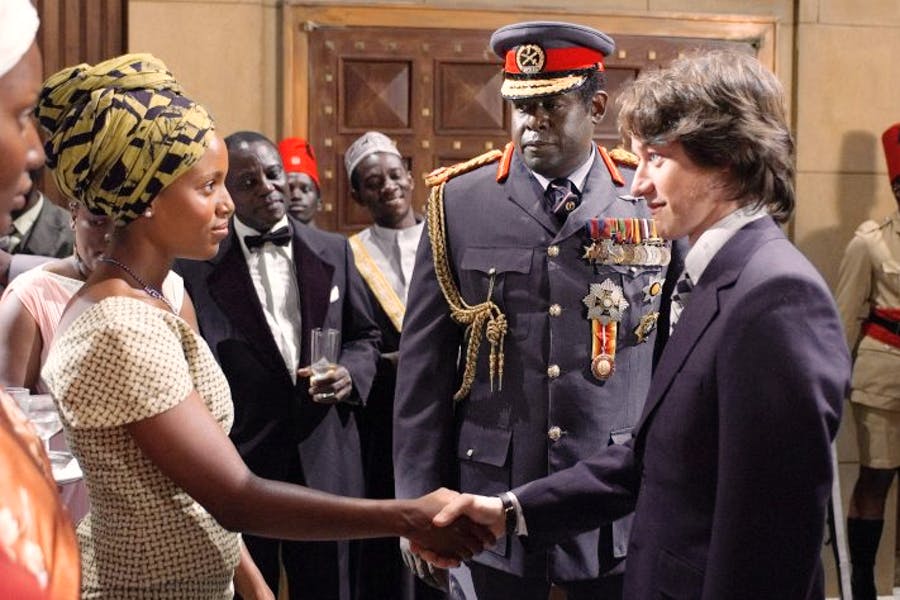We live in a strange time. Forbidden to travel beyond our national borders for fear of infection and quarantine, we are nevertheless all too aware that we are connected to the wider world in all manner of ways. You might even call it chaos theory in action; a man eats a bat in a Chinese market, and a few months later we are all locked up in our homes, terrified to resume our daily lives.
It is this sense of paranoia and interconnectedness that some extremely able filmmakers have tapped into over the years, as their pictures have combined a globe-hopping sweep along with scenes of palm-sweating tension and mystery.
These films, ranging from conspiracy thrillers to Cold War dramas, are some of the most engaging and entertaining examples of the genre, and remain endlessly, compellingly rewatchable. And for some reason, no fewer than three of them feature the excellent Simon McBurney.
Argo
For some strange reason, Ben Affleck’s Oscar-winning thriller did not even see him nominated for Best Director, although it was nominated for plenty of other awards. When he stood up next to George Clooney (his co-producer) with his Academy Award, he looked vindicated, which he should have done; his excellent film is equal parts Hollywood satire and nail-biting thriller.
It revolves around an unbelievable but true story, namely the rescue of six American diplomats from revolutionary Tehran in 1979 under the guise of a sci-fi picture being filmed in the country. As it builds to a nail-biting finale at the airport, Affleck juggles humour and tension with skill, and his fine supporting cast (including Bryan Cranston, Alan Arkin and John Goodman) all provide a mixture of comic relief and thespian gravitas.
Body of Lies
Ridley Scott’s underrated 2008 espionage film features the starry pairing of Leonardo DiCaprio and Russell Crowe as, respectively, a CIA case officer in Iraq and his Machiavellian boss. One of the first films to tackle the moral ambiguities of the ‘war on terror’, it begins with a tense, horrific depiction of a Manchester bombing (all the more awful because of its real-life sequel a few years ago) and then spirals out into a globetrotting adventure, with a brilliant Mark Strong as the Jordanian intelligence chief. Scott mixes thrilling action set-pieces and chewy moral problems with aplomb, and Crowe could not be further from his Oscar-winning performance in Scott’s Gladiator as the duplicitous, sly spymaster.
The International
This Clive Owen and Naomi Watts thriller, about an Interpol agent on the trail of a group of powerful and murderous bankers (topical when the film was made in 2009, no less so now) is a perfectly serviceable film with one of the most outstanding action scenes ever filmed within it. Tom Tykwer, who also co-directed Cloud Atlas, choreographs an astonishing shoot-out within the Guggenheim Museum in New York, which was rebuilt on a sound stage in Berlin in life-size proportions.
As Owen and his cohorts battle heavily armed mercenaries, the scene rivals Heat for visceral thrills and every-bullet-counts drama. If the rest of the film lived up to it, it would have been a masterpiece.
The Last King of Scotland
Forest Whitaker won an Oscar for his brutal performance as the dictator Idi Amin in Kevin Macdonald’s excellent adaptation of Giles Foden’s novel. The storyline revolves around the strange relationship between Amin and a young Scottish doctor, Nicholas Garrigan, who becomes his personal physician, even as Uganda spirals into bloody chaos under Amin’s totalitarian rule.
Whitaker is of course superb as the madman, but McAvoy is every bit as good, simultaneously convincing as a weak-willed playboy and a young man slowly discovering the horror of the regime that he is serving. With a fine script (co-written by Peter Morgan), and a supporting cast that includes Gillian Anderson and David Oyelowo, this is top-class filmmaking.
The Lives of Others
The superbly named Florian Henckel von Donnersmarck made an auspicious debut in 2006 with his Oscar-winning thriller about the Stasi in Eighties East Berlin, as told from the perspective of the ruthless but lonely surveillance operative Wiesler. When he is ordered to spy on a playwright who, despite his impeccable Communist sympathies, is suspected of being a dissident, Wiesler slowly finds his lifelong adherence to the party being challenged.
One of the few political films of recent years that could be described as right-wing – or at least explicitly anti-Communist – it belies any sense of tub-thumping by its wonderfully humane portrayal of a dead man coming alive once again.
It was one of Ulrich Mühe’s last performances as Wiesler – he died of stomach cancer months after the film premiered – and he brought a marvellous humanity to the part, informed in part by his own experiences of being under Stasi surveillance as an actor in East Berlin. When he was asked how he prepared for the part, he replied ‘I remembered.’
The Manchurian Candidate
Simon McBurney appears in Body of Lies and The Last King of Scotland as, respectively, a computer hacker and a duplicitous British diplomat, but he has seldom been as sinister as he is in Jonathan Demme’s remake of the 1962 conspiracy thriller, playing a dastardly geneticist who is responsible for brainwashing the politician Raymond Shaw and attempting to manipulate him into committing heinous and treacherous acts in a dystopian America.
Many of the ideas that the film suggests as satire have come true in the Trumpian post-truth era, which makes it an uncomfortably relevant viewing experience, but it is helped by its marvellous cast, led by Denzel Washington and a brilliantly vile Meryl Streep as Shaw’s ambitious and unscrupulous mother. Any similarities between her and Hillary Clinton are entirely coincidental.






Comments